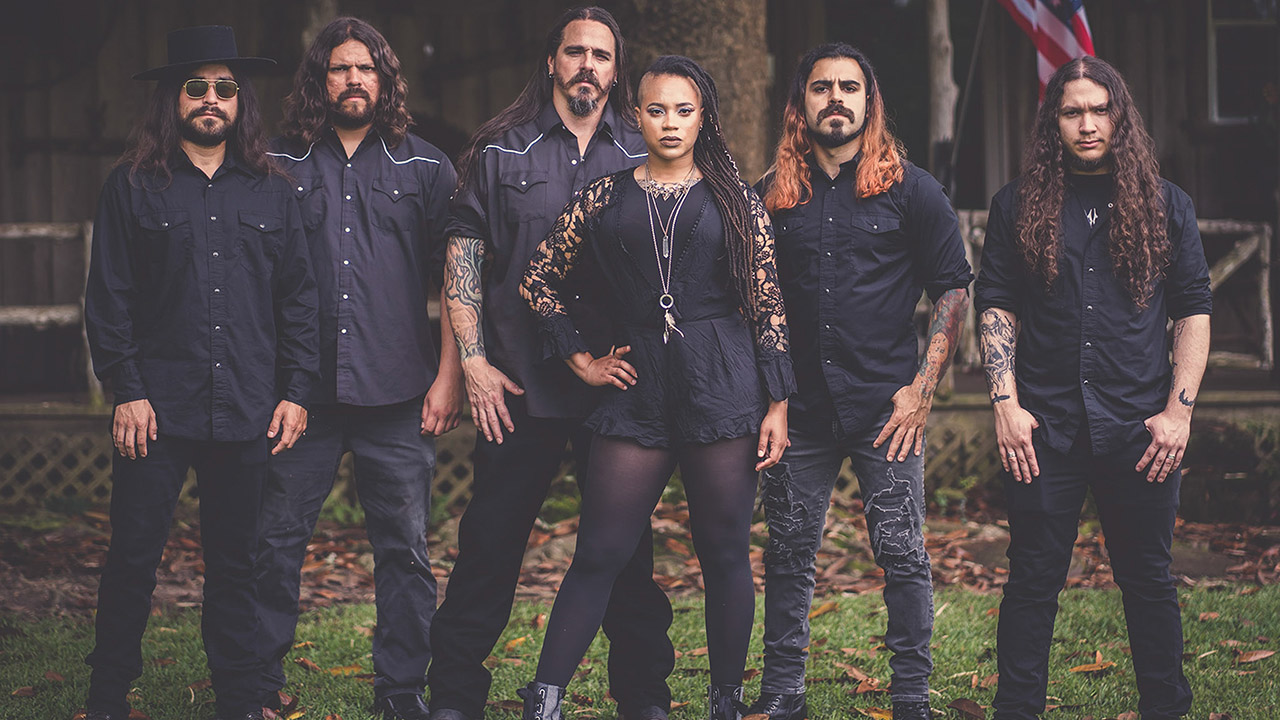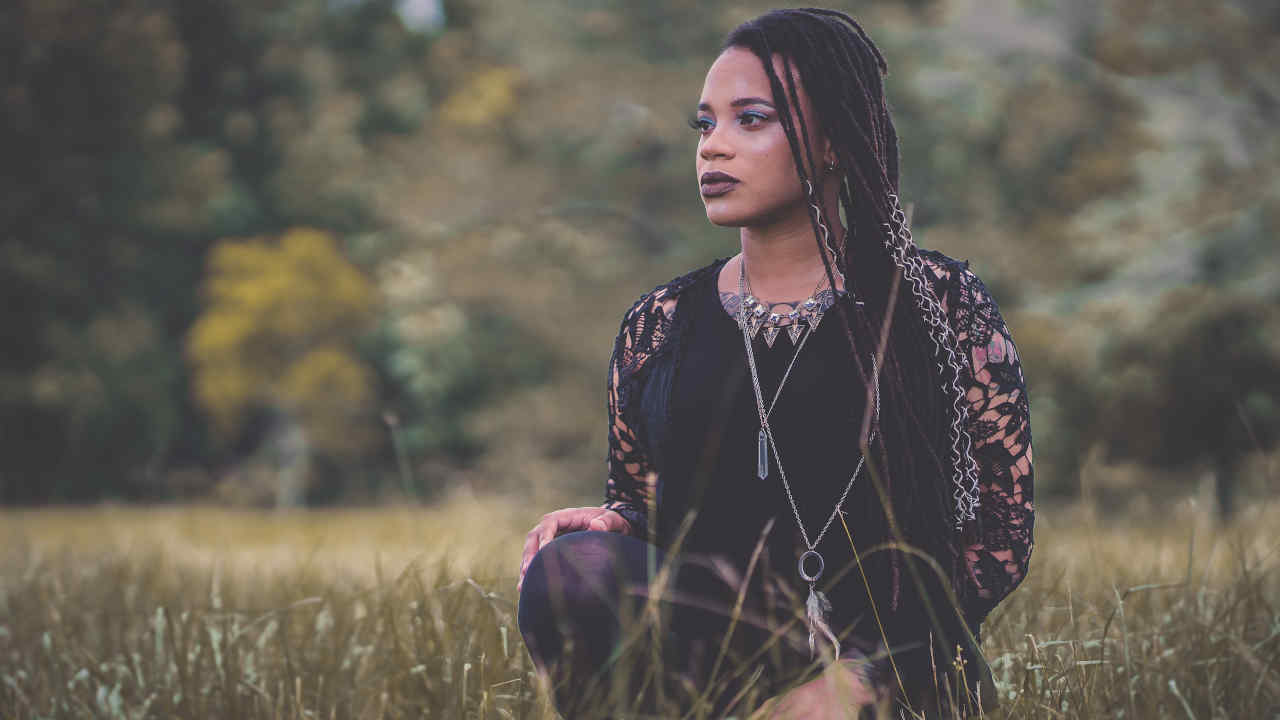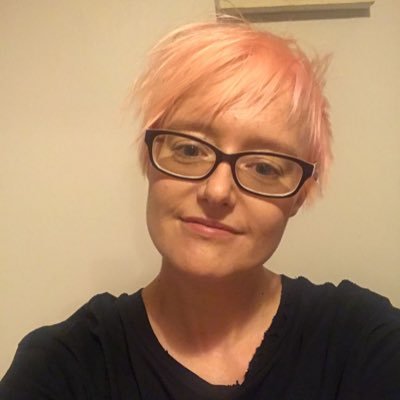By the time Oceans of Slumber released their second record, 2016’s Winter, the Texan progressive metallers had introduced mesmerising vocalist Cammie Gilbert to the line-up and had started embellishing their ornate, mournful sound with dynamics inspired by all corners of the metal spectrum.
But it was their next record that solidified them as one of our world’s most unique and special bands. 2018’s The Banished Heart, deftly merged extreme metal with gothic fragility and doomy, yet soulful, melodies, setting Oceans apart from anything else going on in metal. The band were finding their stride when they hit unexpected turbulence.
Between late 2018 and 2019, founding guitarists, Sean Gary and Anthony Contreras announced their departure, followed by bassist Keegan Kelly, leaving Cammie and her partner, bandleader and drummer Dobber Beverley, on the hunt for new bandmates. Just months later, they’d invited guitarists, Jessie Santos and Alexander Lucian, and bassist Semir Özerkan, into the fold and with the new lineup complete, they headed into the studio to record their majestic self-titled record, Oceans Of Slumber.
We talked to Cammie about the lineup changes, racism in metal and blazing your own progressive path.

- Here are the best turntables right now
- Best in-ear headphones: Louder’s top choice wired and wireless earbuds
- Spotify vs Apple Music vs Tidal: which streaming service is best for rock and metal?
- How to sound like Metallica's James Hetfield
The band has had had some major lineup changes over the last year – what happened?
“Our guitarists [Sean Gary and Anthony Contreras] wanted to explore different influences that just didn’t fit what Oceans was trying to do at the time. Then our ex-bassist [Keegan Kelly] wanted to do styles of music he liked, which never fit with what Oceans was doing. These tensions are normal, but you have to agree at some point, as a band, what focal point you’re going to have and orbit around that. The more you can’t do that, the greater the cracks and the differences are going to become. It was the perfect storm of a midlife crisis amongst the band.”
What have new band members [guitarists, Jessie Santos and Alexander Lucian, and bassist Semir Özerkan] brought to the mix?
“It’s been so refreshing and so much easier. They knew the band before they joined. We could say the right things in the beginning to lay it out fully for how it was going to be. There was no mystery. We went through this process of seeing what everyone’s influences are, seeing what songs resonate with them and you know that you’re getting someone who truly wants to be there and has that same vision and same earnestness as you.”
It sounds like you came together as a family this time…
“At some point originally, that’s how it was with Oceans, but there were tensions as soon as I got into the band. There was definitely a split between the former members not wanting to be “female fronted”.

Really?
“Yeah, after that it was the beginning of the rifts. In the beginning, we had the dinners and did the hangouts, but as the band changed, the mood changed and the focus changed to be more on me. It created this tension, but with the new guys, they love that Oceans is female fronted and they were already fans of the band.”
Why do you think they were unhappy having a female vocalist fronting the band?
“There is a certain metal crowd that thinks its a gimmick. I’m not growling, I just sing clean and am emotional, but a lot of male singers have that emotion too. There’s just stigmas that make anything a woman does, the wrong thing for metal. We had a couple of those old school attitudes and transition wasn’t their strong suite.”
You’ve said this record examines human tendencies to repeat toxic cycles of harm, hatred and violence. What did you mean by that?
“A Return To The Earth Below and Pray For Fire touch on the idea of how pain perpetuates throughout time, throughout a person and throughout society. People underestimate how much things around them influence what they do. When you see people from a socio-economic standing that’s far below or different from yours, you think, ‘Why can’t they just do better or make better decisions?’”
- 2020's essential upcoming metal album releases
- Voivod, Dream Theater, Watchtower and the explosive birth of prog metal
The Black Live Matter movement is throwing the spotlight onto racism in society. Do you think metal has a problem with racism?
“I think racism is everywhere, it’s something more people have to unlearn than they realise, especially in America. There are stereotypes and perspectives that people don’t realise that they have. But any time someone of colour would get into it and tell you, ‘This is what I’ve experienced’, everyone would go, ‘No no, in this culture (metal), everybody’s welcome.’ But that doesn’t always seem to be the case.
“It’s not racism overtly, but I’ve been to plenty of my own shows and I’m the only black person there. That’s not because everyone there is racist, there’s just not that many black people in metal. I go to festivals and I have to understand how I interpret people looking at me, might not always be their intent. I feel like I’ll get looks and it’s like. ‘Oh, she’s here’, not knowing who I am and that I’m playing the festival. There’s a generalised feeling of peoples apprehension to us as a band because they don’t know what we will sound like, or what to expect from us based on what we look like. If they just see a picture of the band, they’re like, ‘There’s a chick in the band’, and it goes one of two ways where I’m either doing death metal growls, or I’m a symphonic singer. There just aren’t many middle-of-the-ground, clean singing female fronted bands.”
How do you feel knowing Oceans are leading a charge there?
“If you’re ever new in forging a path it’s lonely. We’re not doing it for the sake of doing it, this is just what we’ve put together and what feels right for us. It’s cool but it makes it really hard for us to get people to understand what we’re doing and find tours that fit and festivals that want to accept us. Rather than seeing us as, ‘Ok, they can fit anywhere because they have a lot of dynamics’, people tend to be more close-minded and think we don’t fit anywhere.
How irritating that is it to come up against that way of thinking?
“It’s going to take other people doing music [similar] to us. I hate to say copycats, but it would take a band that sounded like us for people to be like, ‘Oh, Oceans did it first’ and then they like it. And it’s like, ‘Asshole, you didn’t like it before there was someone to compare it to!’”
Do you think there is a ceiling on what Oceans Of Slumber can do, or do you think you’re already breaking out of the progressive metal scene?
I think we are already starting to break out of the prog scene. We’re not your typical prog band. It’s wherever the inspiration takes us, we don’t like being boxed in. If people want to continue to like our band, they have to let go of any expectations for what comes next.”

